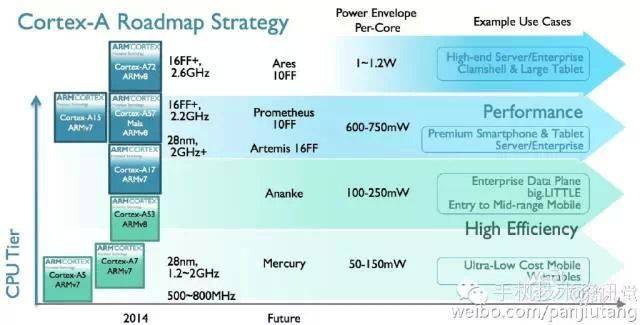A few slides have been leaked including ARM Cortex-A roadmap, allowing to have a peak at what the future will bring after the recently announced Cortex A72, and other existing cores. There’s nothing about performance, but this provides details about the next cores codenames and their manufacturing process.
 ARM cores are sorted into 4 categories:
ARM cores are sorted into 4 categories:
- High-end servers and large tablets – Cortex A72 (16nm FF+) will be supplanted by Ares core optimized for 10 nm FinFET process
- Premium smartphones and tablets / servers – Cortex A15 and A57 cores will give way to Prometheus (10nm FF) and Artemis (16FF) cores
- Enterprise data plane / big.LITTLE entry to mid range Mobile – Ananke cores should take over Cortex A17 and A53 cores.
- Ultra-low cost mobile & wearables – Mercury cores will replace Cortex A5 and A7 cores.
There aren’t any date on the slides, but the new cores might be announced in 2016, before we see them in SoCs and products in 2017.
Via Liliputing and Fudzilla

Jean-Luc started CNX Software in 2010 as a part-time endeavor, before quitting his job as a software engineering manager, and starting to write daily news, and reviews full time later in 2011.
Support CNX Software! Donate via cryptocurrencies, become a Patron on Patreon, or purchase goods on Amazon or Aliexpress





Seems that a dream of having ARM 64-bit powered laptop is more and more realistic.
@davidlt
Indeed, but the problem is single threaded performance. IIRC powerful cores of A line are just 3 issue, while for example Intel’s sandy-bridge is 6 issue and haswell 8 issue core. So those cores are still not comparable unfortunately.
@kcg: There’s several considerations going on here. 3-issue is a performance concern, yes. But the Sandy-bridge and Haswell 6/8-issue designs consume more power, ultimately. Faster is important, yes. But it’s only more important on select things. Lower power consumption while BEING relatively fast is where it’s a bit more important right now.